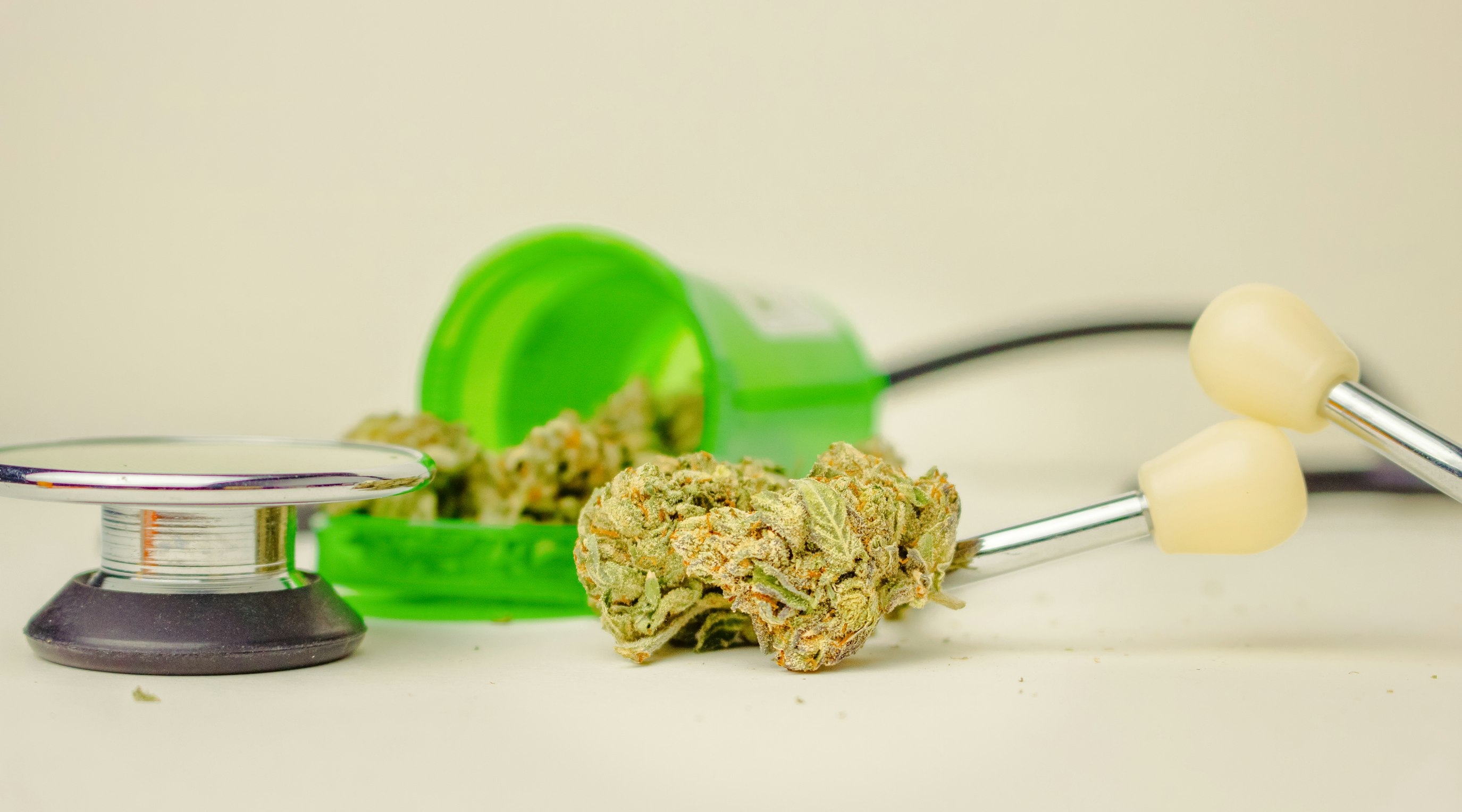How to get a private cannabis prescription in the UK
9 min read
Sam North
Contents
Medical cannabis is a treatment option that, up until pretty recently, a large subsect of the UK public simply didn't know was available. But, thanks to shifting attitudes globally regarding this fascinating plant and its therapeutic compounds, the UK government saw fit to pass legislation making it legal to access for those who need it.
This was back in November 2018, and the change to the law opened up a new chapter for many patients who required access to medical cannabis. And although the NHS is still extremely restrictive regarding the kind of medical conditions it will allow to be treated with cannabis, with only patients suffering from MS, cancer treatment related nausea, and two forms of rare epilepsy being able to access it on prescription – the private sector is much more accommodating.
Private clinics have the autonomy to be more flexible in their approach, and although they abide by the same laws as the NHS, they can prescribe medical cannabis for a much wider range of conditions.
In this comprehensive article, we will guide you through everything you need to know before starting your medical cannabis journey. This includes the conditions that may qualify for a private cannabis prescription, a detailed step-by-step guide on how to obtain a private cannabis prescription in the UK, insights into the risks and benefits associated with medical cannabis, and an estimation of the associated costs. We aim to provide you with a clear and informative guide that allows you to make informed decisions regarding your medical cannabis treatment, and whether it is right for you.
Are you eligible for a private cannabis prescription?
As mentioned above, the private sector can prescribe medical cannabis for a much wider range of health issues than the NHS. There is actually no definitive list of conditions and symptoms that may qualify, as it is up to the discretion of the individual clinician.
However, the Home Office has listed a range of conditions that have been known to respond well to medical cannabis, and up until the time of writing, prescriptions have been written for the following conditions:
- Depression
- Anxiety
- PTSD (Post-Traumatic Stress Disorder)
- Eating disorders
- Chronic Pain
- Sleep disorders
- Chronic fatigue syndrome
- Autism Spectrum Disorder
- ADHD
- Obsessive-compulsive disorder (OCD)
- Migraines
- Epilepsy
- Alzheimer's disease
- Parkinson's disease
- Motor neuron disease
- Multiple sclerosis
- Vomiting and nausea caused by chemotherapy
- Cancer pain
- Fibromyalgia
- Arthritis
- Nerve conditions
- Post-operative surgery pain
- Lower back pain
- Neuropathic pain
If you suffer from any of the above-listed conditions, you are potentially eligible for a prescription. If your health related issues isn't listed above, you may still be eligible for medical cannabis treatment in the UK.
Check out our fast and free medical cannabis eligibility checker to find out more.
How to get a private cannabis prescription in the UK
At Releaf, patient care is our number one priority.
We've streamlined our triage process to ensure patients receive the best level of care as in the shortest time possible, including fast prescription delivery. Our focus is on minimising delays, so you can start your treatment without unnecessary waiting times.
Complete our fast and free medical cannabis eligibility checker
The very first step to becoming a Releaf patient is to head over to our fast and free medical cannabis eligibility checker. This tool is designed to take less than one minute to complete, and you will instantly receive your results.
If you are deemed to be potentially eligible for medical cannabis treatment with Releaf, there are a few steps to then follow.
- Create an account with Releaf
- Access to your medical records (you can either provide these yourself, or we can contact your GP on your behalf).
- Choose a time and date for your initial consultation in the Patient Portal.
- Before your initial consultation, our team of specialists will review your medical records.
- You will then have your initial consultation with one of our medical cannabis specialist doctors.
- Your case will then be brought before our Multidisciplinary Team (MDT) for review.
Our expert MDT, made up of our world-class clinical team of prescribing specialists, nurses, and patient support staff, collaborates to assess your individual needs and design a personalised treatment plan.
If your prescription is approved, it will be sent to our pharmacy partner, Xeal dispensary. You’ll receive both an email and an SMS notification when your prescription is ready for payment. Once payment is processed, our pharmacists will prepare your medication for delivery.
What happens during the initial consultation?
The initial consultation is key to determining if cannabis-based medicine is suitable for your condition. Rather than following a strict questionnaire, our specialists engage in an open discussion with you, reviewing your medical history and asking relevant questions. This conversation allows the specialist to make an informed decision on the appropriateness of medical cannabis for your needs.
Why do you access my medical records?
Accessing your medical records is essential to understanding your overall health. It helps our specialists evaluate your medical history, current treatments, and any potential medication contraindications, ensuring a safe and effective treatment plan.
Why is there an MDT review?
The MDT review ensures that your case is assessed from multiple perspectives. This team-based approach allows a group of specialists, each with different expertise, to discuss the most appropriate treatment options for you. This thorough review process ensures that every aspect of your health is considered when designing your treatment plan.
Every member of our MDT brings extensive knowledge of medical cannabis and patient care, ensuring you receive comprehensive and personalised treatment.
How long does the medical cannabis triage and delivery process take?
Supply chain issues have affected the UK medical cannabis industry, often leading to delays in receiving medication. To address this, we have partnered with Glass PharmsⓇ, the first company to produce UK-grown medical cannabis for patients. This collaboration significantly reduces delivery times, as we are no longer reliant on overseas supplies, allowing patients to receive their medication shortly after approval (within 2-4 days).
Do patients need follow-up consultations?
Yes, continued care is a necessity with medical cannabis treatment.
Medical cannabis affects every patient at least slightly differently, and it is important that you and your specialist track your process to make sure you are getting the best results possible. It’s also necessary as doctors are only able to issue one prescription per month, so you need to speak with the prescribing doctor to get another prescription – if, of course, you want to continue with the medication.
At this stage, your doctor may decide to adjust the dosage or the product they prescribe you.
The potential benefits and risks of medical cannabis
Benefits
Your doctor will discuss the potential benefits and side effects of taking cannabis medicinally. The specific benefits that will apply to your unique circumstances will be different depending on the condition you suffer from. Here are some of the most common ones:
Generally speaking, medical cannabis can help to improve a range of conditions, including chronic pain, muscle spasms, nausea and vomiting associated with chemotherapy, poor appetite, anxiety and post-traumatic stress disorder. It has also been shown to help with sleep disturbances and chronic inflammation, and it can also reduce the severity and frequency of seizures.
It is essential to understand that medical cannabis should never be viewed as a miracle cure. Likewise, it is best applied in a medical setting as a complementary form of treatment alongside traditional medications and therapies. While it has helped many people control the symptoms related to their conditions, it is important to remember that every person’s body and health are different and cannabis may not be suitable for everyone.
Risks
As with all medications, there are potential side effects of taking medical cannabis. This is why it is critical to work carefully with your doctor and to follow their advice on dosage and administration.
- There is the potential for dependence, especially when taking high percentage THC products
- Can cause drowsiness and dizziness
- Can increase heart rate and lead to arrhythmia
- Can lead to memory problems, particularly in young people
- Can impair judgement and coordination, which can lead to accidents or injury
Conclusion
Cannabis prescriptions are becoming increasingly accessible for a wide range of health conditions through private clinics in the UK. From chronic pain management to alleviating symptoms of epilepsy, medical cannabis has shown promising potential in providing relief. If you are experiencing an eligible health issue and are considering medical cannabis as an option, it is significant to have an open and thorough discussion with your doctor to understand both the potential benefits and risks associated with it. Together, you can determine if you are a suitable candidate for a cannabis prescription, tailored to address your specific needs.
Releaf understands that embarking on your medical cannabis journey can be a little overwhelming, and even slightly intimidating – that’s why we offer tailored monthly packages, specialist consultations for medical cannabis, and our unique medical cannabis card to give you the peace of mind that your treatment is protected, all based on your medical cannabis prescription.
Share article
Did you like this article?
It is important to seek medical advice before starting any new treatments. The patient advisors at Releaf are available to provide expert advice and support. Alternatively, click here to book a consultation with one of our specialist doctors.
Elevate your wellness with medical cannabis
Get comprehensive care, convenience, and confidence with an all-in-one treatment plan.
Am I eligible?Authors
Sam North, a seasoned writer with over five years' experience and expertise in medicinal cannabis, brings clarity to complex concepts, focusing on education and informed use.
meet our specialist
Editorial Policy
All of our articles are written by medical cannabis experts, guided by strict sourcing guidelines, and reference peer-reviewed studies and credible academic research. Our expert clinical team and compliance specialists provide valuable insights to ensure accuracy when required. Learn more in our editorial policy.
Need more help?











